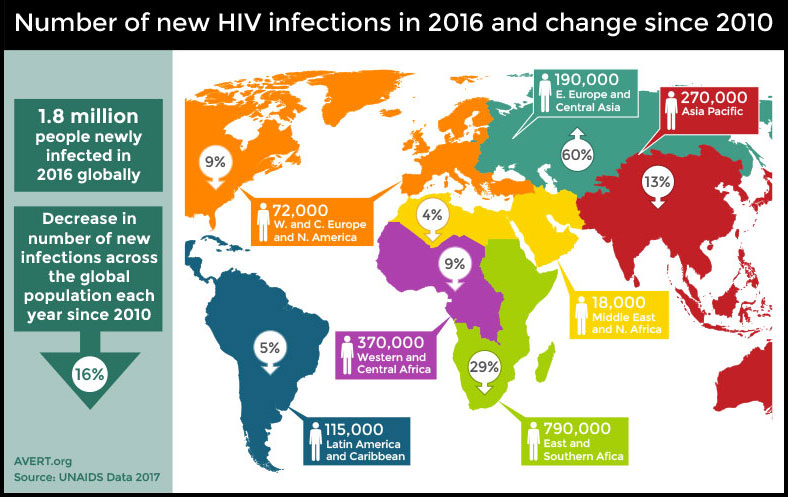
How to Avoid the AIDS Epidemic
How can we avoid the AIDS epidemic? The AIDS virus (HIV) is spread through contact with blood or sexual fluids (like semen and vaginal fluids), usually during vaginal and anal sex. So the only 100% certain way to avoid HIV is to AVOID vaginal or anal sex. HIV is spread through semen, vaginal fluids, blood, and breast milk. The standard advice is to "protect yourself by using CONDOMS every time you have sex, and DON'T SHARE NEEDLES with anyone." But wouldn't it be much better advice to simply say, "AVOID PROMISCUITY and AVOID TAKING ILLICIT DRUGS"? Sodomites die at age 39 with AIDS, or age 45 with hepatitis. But those who "keep all his statutes, aand his commandments", find that their days are "PROLONGED" (Deut. 6:2). Cuba has the lowest incidence of AIDS in the world because they practise QUARANTINE (Num. 5:1-4).
Homosexuals were initial victims because of the number and nature of their sexual encounters. One study revealed that the average male homosexual patient had over 1,100 sexual partners in his lifetime (Science Digest, 1983). Heterosexual transmission (fornication and adultery) is becoming more frequent in the United States and is the dominant mode of transmission in most parts of the world. Therefore, the standard advice is to "limit your number of sexual partners. The more partners you have, the more likely you are to have a partner with HIV or to have a partner with a sexually transmitted disease (STD). Both of these factors can increase the risk of HIV transmission."
People who share needles to inject drugs (piercings or tattoos), also have a much higher risk of being infected with HIV. Blood transfusions in countries with good health care systems only account for about 5% of AIDS infections. ABSTINENCE and MONOGAMY are acknowledged as the most effective means of prevention. PROMISCUOUS SEXUAL BEHAVIOR is the leading cause of AIDS. Avoiding sex outside of marriage and avoiding illicit drugs would stop the AIDS epidemic. Avoid adultery (Exodus 20:14; 1 Cor. 6:9-10). Avoid fornication (Ex. 22:16; 1 Cor. 6:13-18). Avoid homosexuality (Lev. 20:13; 1 Cor. 6:9-10). Avoid contact with others when sick -- especially their body fluids (Lev. 15:1-13; 22:2-7). Avoid deep kissing (if the person with HIV has sores or bleeding in their mouth). It’s easier for HIV to get into your body if you have sores, cuts, or openings in your skin that semen (cum), vaginal fluids, or blood may get into. So don’t have sex if you have a herpes outbreak or other infections. These laws are insurance against gonorrhea, syphilis and herpes as well as AIDS. Ignoring God's laws has serious consequences (Hos. 4:6-12). Women on the Pill have proven to be much more susceptible to VD infections due to changes in genital chemistry. Having other STDs makes you more likely to get HIV, so it’s a good idea to get tested for STDs regularly.
HIV can also spread from an HIV-infected woman to her child during pregnancy, childbirth (also called labor and delivery), or breastfeeding. This spread of HIV is called mother-to-child transmission of HIV. In the past, some people were infected with HIV after receiving a blood transfusion or organ or tissue transplant from an HIV-infected donor. Today, this risk is very low because donated blood, organs, and tissues are carefully tested in the United States. You can’t get HIV from casual contact with a person infected with HIV, for example from a handshake, a hug, or a closed-mouth kiss. And you can’t get HIV from contact with objects such as toilet seats, doorknobs, or dishes used by a person infected with HIV. HIV cannot survive outside the body. It cannot be spread through the air, from touching, or shared cutlery. If adequate safety practices are not in place, healthcare workers can also be at risk of HIV from cuts made by a needle or sharp object (needlestick injury) with infected blood on it. However, the risk of ‘occupational exposure’, is very low in most countries. If you are a healthcare worker, take precautions such as wearing protection (like gloves and goggles). Paul said, "Touch not the unclean thing" (2 Cor. 6:17). Wash hands after contact with blood and other bodily fluids -- "wash your flesh with water" (Lev. 22:6), and safely dispose of sharp equipment and sewage (Deut. 23:12-13).
"If thou wilt diligently hearken to the voice of the Lord thy God, and wilt do that which is right in his sight, and wilt give ear to his commandments, and keep all his statutes, I will put none of these diseases upon thee, which I have brought upon the Egyptians: for I am the Lord that healeth thee" (Ex. 15:26). Jesus predicted global "pestilences" would occur (Matt. 24:7), but "he shall deliver thee from the snare of the fowler, and from the noisome pestilence" (Ps. 91:3).